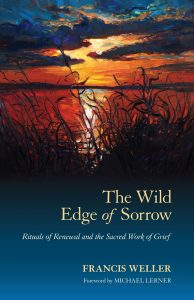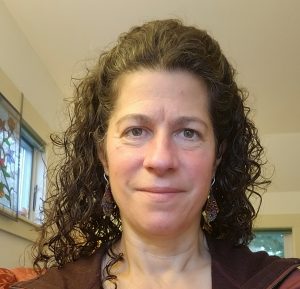Friday
UncategorizedThe Wild Edge of Sorrow
Reviewed by Sara Demetry
The work of the mature person is to carry grief in one hand and gratitude in the other and to be stretched large by them.
Francis Weller, www.thesunmagazine.org/issues/478/the-geography-of-sorrow
Grief around the loss of my mother at age 28 is what turned my mind toward Buddhism and the dharma. It shattered me, and for many years the grief manifested in my body. Years later, I had a dream about my mother, which felt like a visitation, and it freed me to relate to her in a new way, as a guide and part of a larger consciousness. More recently, I began to understand that what I was feeling about the events in the external world – the evidence of a changing climate, species and biodiversity loss – was grief. It was with this growing awareness and distress about our planet, that I happily discovered The Wild Edge of Sorrow.
Weller sets the tone of his book with a quote from Kathleen Dean Moore:
Sorrow is part of the earth’s great cycles, flowing into the night like cool air sinking down a river course. To feel sorrow is to float on the pulse of the earth, the surge from living to dying, from coming into being to ceasing to exist.
The Wild Edge of Sorrow explores how we learn to carry our grief and not collapse or turn away in denial. It helps us see grief as vital and necessary, and not something only to be endured. Weller sets out to engage the reader in a transformative process right from the start. He challenges us to shift our outlook on grief from a period of mourning to an “apprenticeship,” something we relate to throughout our daily life. He views grief as an “initiation” through which we may be transformed.
In contrast to the conventional understanding of grief as something we must “go through,” Weller emphasizes the importance of fully experiencing and navigating grief. While grief can feel isolating and overwhelming, he reminds us that grieving requires a communal container to facilitate healing, allowing us to witness, feel, and release the grief. As a teenager Weller experienced the death of his father, which eventually led to his work as a therapist and facilitator working with groups around grief. His own opening to grief, after years of hardening and suppressing it, is what informs his faith in grief as a transformative process. Although Weller uses language that is based in Christianity, such as “soul” and “God,” his perspective is applicable to all of us.
In addition to personal loss, Weller also addresses the grief that arises from the loss of ecosystems and biodiversity. He speaks of our culture as “increasingly dedicated to death” and calls on us to “stand witness through the power of our grief.” Our ability to consciously grieve and to witness the losses that we feel helpless to stop is, in itself, activism and a duty that we have toward the earth and the more than human world.
It is our job to feel these losses and to mourn them. It is our job to openly grieve for the disappearance of wetlands, the destruction of forests, the shrinking whale populations, the erosion of soil, and on and on. We know the litany of loss, but we have collectively neglected our emotional response to this emptying of our world.
The full context of grief is contained within a framework of five “gates,” and Weller gives us narratives, life examples, and an historical context to illustrate them. These gates are doorways to communal grief because grief, he insists, is meant to be the work of the village and not of the individual alone. Buddhists are quite familiar with the first gate through our teachings on impermanence and death: “Everything we love we will lose.” The remaining gates relate to the more inner aspects of grief and emotional healing: “The places that have not known love,” “The sorrows of the world,” “What we expected and did not receive,” and “Ancestral grief.” Of these gates Weller writes:
We are all familiar with the first gate of grief, which is the sorrow we experience with the loss of someone or something we love. The other four gates receive virtually no attention in modern society. Consequently, the grief that accumulates at these thresholds remains untouched, and we feel the growing weight of unattended sorrows. This is often misdiagnosed as depression. We are pushed down, overwhelmed by so much congested grief.
By giving us a larger context for the experience of grief, Weller helps us reflect on the historical role of grief and grief rituals as well as the ways in which modern life disconnects us from grief and its communal aspects resulting in “congested grief.” He emphasizes the importance of connection with our ancestors as well as the need to experience what we have lost in our modern industrial world with its focus on individualism and economic growth – all to the detriment of our ecosystems and our humanity. Grief invites us to keep our hearts open and connect deeply to our human potential and aliveness. “Grief stirs the heart. It is indeed the song of a soul alive.”
We are invited to engage in “shadow work,” the call of grief to attend to the dark or unacknowledged places within us and within our societies, and to make a relationship with emotions that might otherwise be exiled beyond our awareness. This work is also the work of meditation practice. As we sit with ourselves, we acknowledge whatever arises without getting sidetracked with entertainment or distraction. One could argue that in modern society, this is heroic work. Each person’s engagement in integrating and healing themselves contributes to a society in which it is possible to heal conflicts and recognize our common humanity. Weller asks us not to engage in spiritual bypass, not to privilege the “ascension:”
Our culturally ingrained associations with the sacred usually connect it with the heavens, with the sky and the light. We like the idea of ascension, of things rising and moving toward the light. We are uncomfortable when we slip and fall, when we find ourselves descending into the darkness. However, when we compress the sacred into the narrow band of the heavens, we deny the holiness that dwells in the dark, in the roots of the earth, in the shadows within our bodies, the womb of our beginnings.
Weller puts such a positive spin on grief we are compelled to curiosity about our grief experiences. He assures us if we accept the invitation to feel and accompany our grief, facilitated through grief rituals, we can experience the transformative power of grief. Ritual allows us to feel, witness, and then let go of what has died, enabling us to move into what is born from the ashes. In the process we become more whole, more capable of gratitude and joy. Weller describes what we might know as sad joy:
Life is hard, filled with loss and suffering. Life is glorious, stunning, and incomparable. To deny either truth is to live in some fantasy of the ideal or to be crushed by the weight of pain. Instead, both are true, and it requires a familiarity with both sorrow and joy to fully encompass the full range of being human.
We can’t access true joy without owning our grief. For those of us who feel deeply the pain of the environmental losses to habitats, ecosystems and species diversity, Weller reminds us we are not separate from the earth, however conditioned we are to believe our separateness. We overcome this through an ongoing relationship with grief. The Wild Edge of Sorrow offers us the possibility of reuniting “through the unexpected grace of fear, despair, and grief, with the body of the earth.”
FRANCIS WELLER, MFT, is a psychotherapist, writer, and soul activist. A master of synthesizing diverse streams of thought from psychology, anthropology, mythology, alchemy, indigenous cultures, and poetic traditions, he has introduced the healing work of ritual to thousands of people. The core of his work is creating pathways to reclaiming our indigenous soul, what psychologist Carl Jung called the “unforgotten wisdom” that resides in the heart of the psyche. To further his work, he founded and currently directs WisdomBridge, an organization offering educational programs that seek to integrate the wisdom from traditional cultures with the insights and knowledge gathered from western cultures.
Sara Demetry has been a member of the Shambhala community since 1998. She lives in rural Vermont on Abenaki land, and works as a clinical social worker in private practice with primary interests in trauma recovery, griefwork, and resilience building. She facilitates a monthly group through Touching the Earth Collective focusing on communal processing of ecological and personal grief. She is also passionate about gardening, herbalism, and engaged Buddhism.







